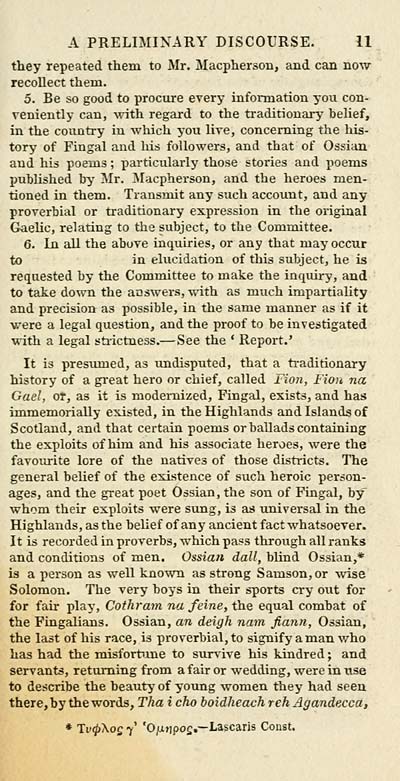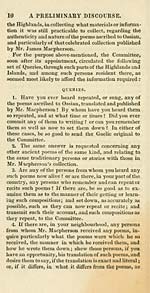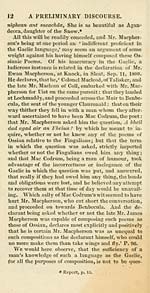Ossian Collection > Poems of Ossian
(19)
Download files
Complete book:
Individual page:
Thumbnail gallery: Grid view | List view

A PRELIMINARY DISCOURSE. 11
they repeated them to Mr. Macpherson, and can now
recollect them.
5. Be so good to procure every information you con-
veniently can, -with regard to the traditionary belief,
in the country in which you live, concerning the his-
tory of Fingal and his followers, and that of Ossian
and his poems ; particularly those stories and poems
j)ublished by Mr. Macpherson, and the heroes men-
tioned in them. Transmit any such account, and any
proverbial or traditionary expression in the original
Gaelic, relating to the subject, to the Committee.
6. In all the above inquiries, or any that may occur
to in elucidation of this subject, he is
requested by the Committee to make the inquiry, and
to take down the answers, with as much impartiality
and precision as possible, in the same manner as if it
were a legal question, and the proof to be investigated
with a legal stiictness. — See the ' Report.'
It is presumed, as imdisputed, that a traditionary
history of a gi'eat hero or chief, called Fion, Fioii na
Gael, or, as it is modernized, Fingal, exists, and has
immemorially existed, in the Highlands and Islands of
Scotland, and that certain poems or ballads containing
the exploits of him and his associate heroes, were the
favoimte lore of the natives of those districts. The
general belief of the existence of such heroic person-
ages, and the great poet Ossian, the son of Fingal, by
whom their exploits were sung, is as tmiversal in the
Highlands, as the belief of any ancient fact whatsoever.
It is recorded in proverbs, which pass through all ranks
and conditions of men. Ossian dall, blind Ossian,*
is a person as well known as strong Samson, or ^vise
Solomon. The very boys in their sports cry out for
for fair play, Cothram na feine, the equal combat of
the Fingalians. Ossian, an deigh nam fiann, Ossian,
the last of his race, is proverbial, to signify a man who
has had the misforbme to sursive his kindred ; and
servants, returning from a fair or wedding, were in use
to describe the beauty of young women they had seen
there, by the words, Tha i cho boidheach reh Agandecca,
* 'Tv<p'Kog 7' 'O^npog.— Lascaris Const.
they repeated them to Mr. Macpherson, and can now
recollect them.
5. Be so good to procure every information you con-
veniently can, -with regard to the traditionary belief,
in the country in which you live, concerning the his-
tory of Fingal and his followers, and that of Ossian
and his poems ; particularly those stories and poems
j)ublished by Mr. Macpherson, and the heroes men-
tioned in them. Transmit any such account, and any
proverbial or traditionary expression in the original
Gaelic, relating to the subject, to the Committee.
6. In all the above inquiries, or any that may occur
to in elucidation of this subject, he is
requested by the Committee to make the inquiry, and
to take down the answers, with as much impartiality
and precision as possible, in the same manner as if it
were a legal question, and the proof to be investigated
with a legal stiictness. — See the ' Report.'
It is presumed, as imdisputed, that a traditionary
history of a gi'eat hero or chief, called Fion, Fioii na
Gael, or, as it is modernized, Fingal, exists, and has
immemorially existed, in the Highlands and Islands of
Scotland, and that certain poems or ballads containing
the exploits of him and his associate heroes, were the
favoimte lore of the natives of those districts. The
general belief of the existence of such heroic person-
ages, and the great poet Ossian, the son of Fingal, by
whom their exploits were sung, is as tmiversal in the
Highlands, as the belief of any ancient fact whatsoever.
It is recorded in proverbs, which pass through all ranks
and conditions of men. Ossian dall, blind Ossian,*
is a person as well known as strong Samson, or ^vise
Solomon. The very boys in their sports cry out for
for fair play, Cothram na feine, the equal combat of
the Fingalians. Ossian, an deigh nam fiann, Ossian,
the last of his race, is proverbial, to signify a man who
has had the misforbme to sursive his kindred ; and
servants, returning from a fair or wedding, were in use
to describe the beauty of young women they had seen
there, by the words, Tha i cho boidheach reh Agandecca,
* 'Tv<p'Kog 7' 'O^npog.— Lascaris Const.
Set display mode to: Large image | Transcription
Images and transcriptions on this page, including medium image downloads, may be used under the Creative Commons Attribution 4.0 International Licence unless otherwise stated. ![]()
| Early Gaelic Book Collections > Ossian Collection > Poems of Ossian > (19) |
|---|
| Permanent URL | https://digital.nls.uk/81238097 |
|---|
| Description | Selected books from the Ossian Collection of 327 volumes, originally assembled by J. Norman Methven of Perth. Different editions and translations of James MacPherson's epic poem 'Ossian', some with a map of the 'Kingdom of Connor'. Also secondary material relating to Ossianic poetry and the Ossian controversy. |
|---|
| Description | Selected items from five 'Special and Named Printed Collections'. Includes books in Gaelic and other Celtic languages, works about the Gaels, their languages, literature, culture and history. |
|---|

